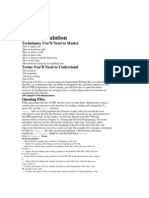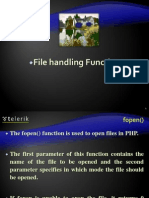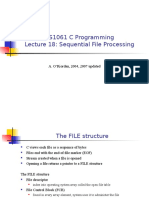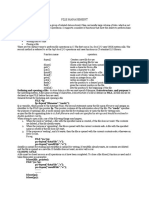File Handling in PHP
Uploaded by
Mak MadzFile Handling in PHP
Uploaded by
Mak MadzFile Handling in PHP Opening and Closing Files Files are opened in PHP using the fopen command.
The command takes two parameters, the file to be opened, and the mode in which to open the file. The function returns a file pointer if successful, otherwise zero (false). Files are opened with fopen for reading or writing. $fp fopen(!m"file.t#t!, !r!)$
%f fopen is unable to open the file, it returns &. This can be used to e#it the function with an appropriate message. if ( '($fp fopen(!m"file.t#t!, !r!) ) )
e#it(!(nable to open the input file.!)$ File Modes The following table shows the different modes the file may be opened in. File Modes r r* w w* a a* # Description )ead onl". File pointer at the start of the file )ead+,rite. File pointer at the start of the file ,rite onl". Truncates the file (o-erwriting it). %f the file doesn.t e#ist, fopen() will tr" to create the file )ead+,rite. Truncates the file (o-erwriting it). %f the file doesn.t e#ist, fopen() will tr" to create the file /ppend. File pointer at the end of the file. %f the file doesn.t e#ist, fopen() will tr" to create the file )ead+/ppend. File pointer at the end of the file. %f the file doesn.t e#ist, fopen() will tr" to create the file 0reate and open for write onl". File pointer at the beginning of the file. %f the file alread" e#ists, the fopen() call will fail and generate an error. %f the file does not e#ist, tr" to create it 0reate and open for write onl". File pointer at the beginning of the file. %f the file alread" e#ists, the fopen() call will fail and generate an error. %f the file does not e#ist, tr" to create it
#*
1ote2 The mode ma" also contain the letter .b.. This is useful onl" on s"stems which differentiate between binar" and te#t files (i.e. ,indows. %t.s useless on (ni#+3inu#). %f not needed, it will be ignored. Closing a File The fclose function is used to close a file when "ou are finished with it. fclose($fp)$ Reading from Files 4ou can read from files opened in r, r*, w*, and a* mode. The feof function is used to determine if the end of file is true. if ( feof($fp) ) echo !5nd of file6br7!$
The feof function can be used in a while loop, to read from the file until the end of file is encountered. / line at a time can be read with the fgets function2 while( 'feof($fp) ) 8 ++ )eads one line at a time, up to 9:; characters. 5ach line ends with a newline. ++ %f the length argument is omitted, PHP defaults to a length of <&9;. $m"line fgets($fp, 9::)$ echo $m"line$ = 4ou can read in a single character at a time from a file using the fgetc function2 while( 'feof($fp) ) 8 ++ )eads one character at a time from the file. $ch fgetc($fp)$ echo $ch$ = 4ou can also read a single word at a time from a file using the fscanf function. The function takes a -ariable number of parameters, but the first two parameters are mandator". The first parameter is the file handle, the second parameter is a 0>st"le format string. /n" parameters passed after this are optional, but if used will contain the -alues of the format string. $listFile !list.t#t!$ ++ ?ee ne#t page for file contents if ('($fp fopen($listFile, !r!))) e#it(!(nable to open $listFile.!)$ while ('feof($fp)) 8 ++ /ssign -ariables to optional arguments $buffer fscanf($fp, !@s @s @d!, $name, $title, $age)$ if ($buffer A) ++ $buffer contains the number of items it was able to assign print !$name $title $age6br7Bn!$ = Here is the file list.t#t2 Ca-e Programmer A; ?ue Cesigner 9< 3isa Programmer 9D 1igel (ser <D 4ou can also store the -ariables in an arra" b" omitting the optional parameters in fscanf2 while ('feof($fp)) 8 $buffer fscanf($fp, !@s @s @d!)$ ++ /ssign -ariables to an arra" ++ (se the list function to mo-e the -ariables from the arra" into -ariables list($name, $title, $age) $buffer$ print !$name $title $age6br7Bn!$ = 4ou can read in an entire file with the fread function. %t reads a number of b"tes from a file, up to the end of the file (whiche-er comes first). The filesize function returns the size of the file in b"tes, and can be used with the fread function, as in the following e#ample. $listFile !m"file.t#t!$ if ('($fp fopen($listFile, !r!))) e#it(!(nable to open the input file, $listFile.!)$ $buffer fread($fp, filesize($listFile))$ echo !$buffer6br7Bn!$ fclose($fp)$ 4ou can also use the file function to read the entire contents of a file into an arra" instead of opening the file with fopen2 $arra" file(Efilename.t#tF)$ 5ach arra" element contains one line from the file, where each line is terminated b" a newline. Writing to Files The fwrite function is used to write a string, or part of a string to a file. The function takes three parameters, the file handle, the string to write, and the number of b"tes to write. %f the number of b"tes is omitted, the whole string is written to the file. %f "ou want the lines to
appear on separate lines in the file, use the Bn character. 1ote2 ,indows reGuires a carriage return character as well as a new line character, so if "ou.re using ,indows, terminate the string with BrBn. The following e#ample logs the -isitor to a file, then displa"s all the entries in the file. 6Hphp $logFile !stats.t#t!$ $fp fopen($logFile, !a*!)$ ++ Ipen the file in append+read mode $userCetails $J?5)K5)LEHTTPJ(?5)J/M51TFN$ ++ 0reate a string containing user details if (isset($J?5)K5)LEHTTPJ)5F5)5)FN)) $userCetails . ! 8$J?5)K5)LEHTTPJ)5F5)5)FN=6br7BrBn!$ else $userCetails . !6br7BrBn!$ fwrite($fp, !$userCetails!)$ ++ ,rite the user details to the file rewind($fp)$ ++ Oo-e the file pointer to the start of the file $entries &$ while('feof($fp)) 8 ++ Cispla" each line in the file $buffer fgets($fp, <&9;)$ if ($buffer ' !!) 8 echo $buffer$ $entries**$ = = ++ ?how a summar" echo !There are $entries entries in the log file6br7!$ fclose ($fp)$
H7
oc!ing Files boolean flock ( resource fp, integer operation) PHP supports a portable wa" of locking complete files in an ad-isor" wa" (which means all accessing programs ha-e to use the same wa" of locking or it will not work). %f there is a possibilit" that more than one process could write to a file at the same time then the file should be locked. flock() operates on fp which must be an open file pointer. operation is one of the following2 P To acGuire a shared lock (reader), set operation to 3I0QJ?H P To acGuire an e#clusi-e lock (writer), set operation to 3I0QJ5R P To release a lock (shared or e#clusi-e), set operation to 3I0QJ(1 P %f "ou don.t want flock() to block while locking, add 3I0QJ1S to 3I0QJ?H or 3I0QJ5R ,hen obtaining a lock, the process ma" block. That is, if the file is alread" locked, it will wait until it gets the lock to continue e#ecution. flock() allows "ou to perform a simple reader+writer model which can be used on -irtuall" e-er" platform (including most (ni# deri-ati-es and e-en ,indows). flock() returns T)(5 on success and F/3?5 on error (e.g. when a lock could not be acGuired). Here is a script that writes to a log file with the fputs function and then displa"s the log fileFs contents2 6Hphp $fp fopen(T+tmp+log.t#tU, TaU)$ flock($fp, 3I0QJ5R)$ ++ get lock fputs($fp, date(Th2i / l F d?, 4BnU))$ ++ add a single line to the log file flock($fp, 3I0QJ(1)$ ++ release lock fclose($fp)$ echo T6pre7U$ ++ dump log readfile(T+tmp+log.t#tU)$ echo T6+pre7BnU$ H7 Other "sef#l File F#nctions The opendir function returns a director" handle$ closedir closes a director"$ readdir reads a director" entr".
$m"Cirector" opendir(T.U)$ ++ use the current director" while($entr"name readdir($m"Cirector")) 8 echo T6tr7U$ echo T6td7$entr"name6+td7U$ echo T6td align BUrightBU7U$ echo filesize($entr"name)$ ++ the filesize function returns the file size in b"tes echo T6+td7U$ echo T6+tr7BnU$ = closedir($m"Cirector")$ The isJdir function tests if a filename refers to a director"2 if(isJdir($filename)) echo $filename . T is a director"U$ The isJfile function determines if a filename refers to a file2 if(isJfile($filename)) echo $filename . T is a fileU$ The isJreadable function returns T)(5 if the file e#ists and it is readable, otherwise it returns false. In (ni#+3inu# this is determined b" the fileFs permissions. In ,indows, T)(5 is alwa"s returned if the file e#ists. if(isJreadable($filename)) echo $filename . T is readableU$ The isJwritable function determines whether the ser-er will allow "ou to write data to the file before "ou attempt to open it2 if(isJwritable(E..+Guotes.t#tF)) 8 ++ attempt to open the file and write to it = else 8 echo EThe file is not writableF$ =
You might also like
- File Manipulation: Techniques You'll Need To MasterNo ratings yetFile Manipulation: Techniques You'll Need To Master6 pages
- File Handling in C With Examples (Fopen, Fread, Fwrite, Fseek)No ratings yetFile Handling in C With Examples (Fopen, Fread, Fwrite, Fseek)9 pages
- Lecture Three - Files, Structures and Memory Allocation: What These Lecture Notes CoverNo ratings yetLecture Three - Files, Structures and Memory Allocation: What These Lecture Notes Cover10 pages
- PHP - Files & I/O: Opening and Closing FilesNo ratings yetPHP - Files & I/O: Opening and Closing Files4 pages
- 14.module4 - PHP FILE EMAIL NEW - 12 PDFNo ratings yet14.module4 - PHP FILE EMAIL NEW - 12 PDF32 pages
- CS8651 - IP - UNIT - IV - 6 - File HandlingNo ratings yetCS8651 - IP - UNIT - IV - 6 - File Handling7 pages
- CS1061 C Programming Lecture 18: Sequential File Processing: A. O'Riordan, 2004, 2007 UpdatedNo ratings yetCS1061 C Programming Lecture 18: Sequential File Processing: A. O'Riordan, 2004, 2007 Updated13 pages
- Filing: FILE Is A Structure and It Is Defined in The Stdio.h HeaderNo ratings yetFiling: FILE Is A Structure and It Is Defined in The Stdio.h Header18 pages
- Cloud Computing: Mark Anthony Duque MadalipayNo ratings yetCloud Computing: Mark Anthony Duque Madalipay38 pages
- Document / S Complied Not Complied Date Complied: Picture of ApplicantNo ratings yetDocument / S Complied Not Complied Date Complied: Picture of Applicant2 pages
- Principles of Teaching: The Teacher and The Teaching ProfessionNo ratings yetPrinciples of Teaching: The Teacher and The Teaching Profession4 pages
- Welcome: Human Resource Management ClassNo ratings yetWelcome: Human Resource Management Class9 pages
- File Transfer Protocol (Aug. 12, 1973) RFC 542 NIC 17759No ratings yetFile Transfer Protocol (Aug. 12, 1973) RFC 542 NIC 1775942 pages
- A Short Course in Python For AstronomersNo ratings yetA Short Course in Python For Astronomers21 pages
- List of Questions: 1: Internal Examiner External ExaminerNo ratings yetList of Questions: 1: Internal Examiner External Examiner3 pages
- Write Assembly Language Program To Check String Is Palindrome or NotNo ratings yetWrite Assembly Language Program To Check String Is Palindrome or Not15 pages
- CS201 MidTerm Past Paper 2013 (WWW - Virtualstudysolutions.blogspot - Com)No ratings yetCS201 MidTerm Past Paper 2013 (WWW - Virtualstudysolutions.blogspot - Com)5 pages
- File Manipulation: Techniques You'll Need To MasterFile Manipulation: Techniques You'll Need To Master
- File Handling in C With Examples (Fopen, Fread, Fwrite, Fseek)File Handling in C With Examples (Fopen, Fread, Fwrite, Fseek)
- Lecture Three - Files, Structures and Memory Allocation: What These Lecture Notes CoverLecture Three - Files, Structures and Memory Allocation: What These Lecture Notes Cover
- CS1061 C Programming Lecture 18: Sequential File Processing: A. O'Riordan, 2004, 2007 UpdatedCS1061 C Programming Lecture 18: Sequential File Processing: A. O'Riordan, 2004, 2007 Updated
- Filing: FILE Is A Structure and It Is Defined in The Stdio.h HeaderFiling: FILE Is A Structure and It Is Defined in The Stdio.h Header
- Perl One-Liners: 130 Programs That Get Things DoneFrom EverandPerl One-Liners: 130 Programs That Get Things Done
- Document / S Complied Not Complied Date Complied: Picture of ApplicantDocument / S Complied Not Complied Date Complied: Picture of Applicant
- Principles of Teaching: The Teacher and The Teaching ProfessionPrinciples of Teaching: The Teacher and The Teaching Profession
- File Transfer Protocol (Aug. 12, 1973) RFC 542 NIC 17759File Transfer Protocol (Aug. 12, 1973) RFC 542 NIC 17759
- List of Questions: 1: Internal Examiner External ExaminerList of Questions: 1: Internal Examiner External Examiner
- Write Assembly Language Program To Check String Is Palindrome or NotWrite Assembly Language Program To Check String Is Palindrome or Not
- CS201 MidTerm Past Paper 2013 (WWW - Virtualstudysolutions.blogspot - Com)CS201 MidTerm Past Paper 2013 (WWW - Virtualstudysolutions.blogspot - Com)































































































